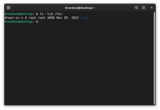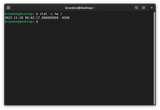What is your oldest linux install you actively use? This is a weird HTPC/server kind of thing but I threw nixOS on it after I spent like 3 hours learning about it and it's been running with minimal changes since. Sometimes it's annoying but it's been a pretty reclined experience.
>>106145678 (OP)hi nix fren
it would probably be my mail server. tho i reinstall my distros semi-often
not "actively" but I have a old dell Latitude with Fedora 38 that I still boot to from time to time to access some old files
>>106145678 (OP)stat -c %w /
is more reliable btw
My oldest install is my webserver
>>106146189Interesting, did not know that
>>106145678 (OP)I've been on the same Fedora install since 2021.
You're going to need it now, since Linux is removing features: from ReiserFS3: still the best /var/ FS that existed, to CD-RW 32k packetwrighting (used for streaming logs to a CD burner, and then editing them if you wish, IBM used this), to disallowing 16 bit exec from 64 bit executable (breaks Wine, breaks all maxis game installers for instance) by default, to losing PaX/Grsecurity by not suing them for copyright infingement.
Linus is our enemy now.
He rejected and threw out the hackers who made his operating system: and the hacker ethos with it.
>>106145678 (OP)I have some AIX servers at work from 2004 that will be decommissioned in October. Kinda sad to see them go, Ive looked after these since 2010 and even spoke to the guy who set them up.
#!/bin/sh
e=$(( ( $(date +%s) - $(date -d "$(tune2fs -l $(findmnt -n -o SOURCE /) 2>/dev/null | grep "Filesystem created" | cut -d: -f2-)" +%s) ) / 86400 )); y=$(( e / 365 )); d=$(( e % 365 )); if [ $e -ge 365 ]; then echo "$y year$( [ $y -ne 1 ] && echo s )$( [ $d -gt 0 ] && echo " and $d day$( [ $d -ne 1 ] && echo s )" )"; else echo "$e day$( [ $e -ne 1 ] && echo s )"; fi





